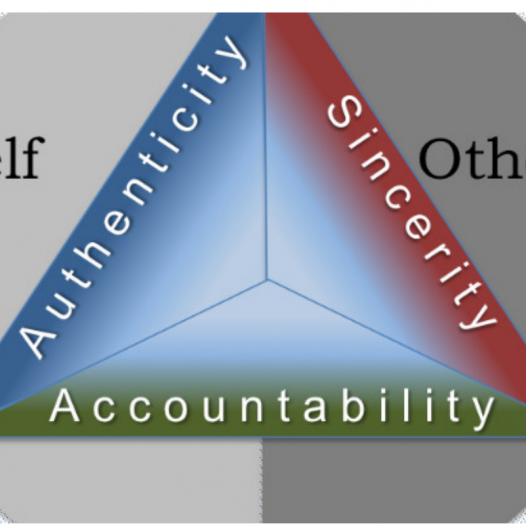There are three distinct ways that each of us may improve our integrity. And by so doing, bolster the very core of our leadership capacity. I teach MBA students about leadership. And I strive to deepen their capacity for it. In the process I learn with them. The Confucian rule applies: “If you want to learn something, teach it.” In an attempt to understand and share a comprehensive mapping of what I believe constitutes a person who leads, I have — through my reading, conversations and my direct experience – identified three dimensions that together make up integrity, which sits in the core of my leadership map. You might even say these three dimensions are integral to a rich understanding of
integrity. In particular, leadership integrity. Because when you have the trust of followers your personal integrity is put to its toughest test.
Before explaining what I have to offer you as a way to work on your integrity, let’s first think for a moment about what the word integrity means to you and most others. If we’re talking about the integrity of a person, the most common meaning is “honesty”. That’s also what your dictionary look-up will
tell you. If we’re talking about an object, such as a building, the most common meaning for integrity is complete, held-together properly, of sound construction.
My definition of leadership integrity relies on contributions from both of these common but different meanings to give it the clarity and richness of meaning we need to guide our path as leaders. But it needs a bit more. Leadership is a social enterprise; it is work done with others. But it also demands a deep understanding of self. And so it is the active balancing of thought, word and action between our selves and others that becomes the testing ground for our attempts to lead. The trials we face in this arena will reveal how well aligned we are between what we think, what we say, and what we do.
The first of three dimensions is self-relational; it is authenticity. You have likely read many variations of what this word may mean. My simple version is: the actions you take are aligned with the thoughts you have about your
self. If you have ever experienced the voice in your head after something you did, declaring “That’s not me”, you know of what I speak.
The second dimension is other-relational: sincerity. This has a less varied connotation than does authenticity. My interpretation is simply: the words you say to others are aligned with the thoughts you have about others. And the third is the dimension that gets talked about the most in business – because it seems to be the toughest to fulfill: accountability. Accountability is both self-relational and other-relational. In simple terms, it means the actions you take are aligned with the words you have expressed to others.
So, if you are the kind of person who: acts in a way that is close to the person you think you are, and says to others the same as what you think (when it is right to say anything at all), & does what you tell others you will do. Then you are indeed a person operating in the rarified air of leadership integrity.
But if you are like me, not yet satisfied with your progress in any of the three dimensions that together make up integrity, you now have some clearly defined areas you can work in, and work on – to strengthen your leadership capacity. I hope these words will spur your action. At the very least, do say you’ll think about it.
Bill Carroll helps business leaders strengthen their leadership
integrity — among other individual and team coaching services, as a Partner in the Newport Board Group.





